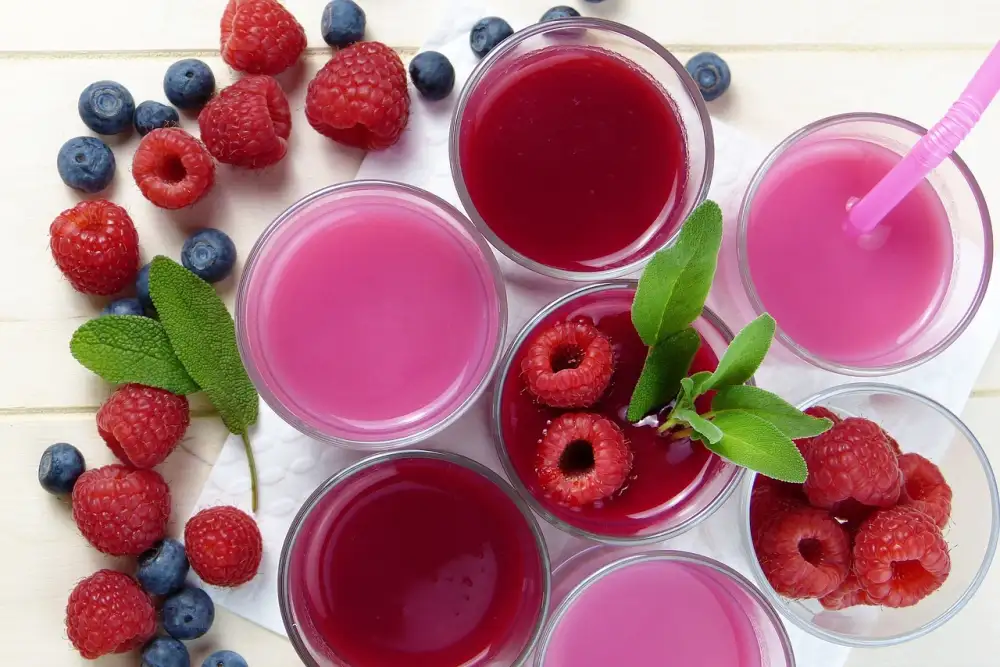Revitalize Your Health with the Power of a Juice Diet: Unleashing the Benefits of Liquid Nutrition

In today's fast-paced world, where convenience often takes precedence over health, it's important to find ways to nourish our bodies and revitalize our health. One such way is through the power of a juice diet. A juice diet involves consuming fresh juices made from fruits and vegetables, providing a concentrated dose of essential vitamins, minerals, and antioxidants. This liquid nutrition can help cleanse the body, boost energy levels, and promote overall well-being. In this article, we will delve into the benefits of a juice diet, explore different types of juices for a juice diet, learn how to start a juice diet, discover tips for a successful journey, discuss potential risks and precautions, explore incorporating exercise with a juice diet, address frequently asked questions about juice diets, and ultimately embrace the magic that comes with embracing a juice diet. So let's dive in and unlock the secrets of liquid nutrition!
Benefits of a Juice Diet
A juice diet offers numerous benefits for your overall health and well-being. Firstly, it provides a convenient way to consume a wide variety of fruits and vegetables in one sitting. This means you can easily meet your daily recommended intake of vitamins, minerals, and antioxidants.
Secondly, the nutrients in fresh juices are easily absorbed by the body, as they require minimal digestion. This allows your body to quickly access the essential nutrients it needs to function optimally.
Moreover, a juice diet can help boost your immune system, as fruits and vegetables are packed with immune-boosting compounds. Regular consumption of fresh juices can strengthen your body's defense mechanisms and reduce the risk of illnesses.
Additionally, juicing can aid in weight loss or maintenance. By replacing high-calorie meals or snacks with nutrient-dense juices, you can reduce calorie intake while still providing your body with essential nutrients. This can lead to gradual weight loss and improved metabolic function.
Furthermore, a juice diet can improve digestion and promote detoxification. The high fiber content in some juices helps regulate bowel movements and alleviate digestive issues. Additionally, certain fruits and vegetables have natural detoxifying properties that support liver function and eliminate toxins from the body.
Lastly, incorporating a juice diet into your lifestyle can enhance skin health. The abundance of vitamins and antioxidants found in fresh juices nourish the skin from within, promoting a healthy complexion and reducing signs of aging.
In conclusion, a juice diet offers numerous benefits for your health and well-being. It provides a convenient way to consume essential nutrients, boosts immunity, aids in weight loss or maintenance, improves digestion and detoxification processes, and enhances skin health. Embrace the power of liquid nutrition to revitalize your health today!
Types of Juices for a Juice Diet
When embarking on a juice diet, it is essential to have a variety of juices to ensure you are getting a wide range of nutrients. Here are some popular types of juices that can be incorporated into your juice diet:
1. Green Juices: These juices are made from leafy greens like spinach, kale, and Swiss chard. They are rich in vitamins, minerals, and antioxidants, which help detoxify the body and boost immunity.
2. Citrus Juices: Orange, grapefruit, and lemon juices are packed with vitamin C and other essential nutrients. They provide a refreshing burst of flavor and can aid in digestion.
3. Beetroot Juice: Beetroot juice is known for its detoxifying properties and ability to improve blood circulation. It is also rich in iron and folate, making it an excellent choice for those with anemia.
4. Carrot Juice: Carrot juice is high in beta-carotene, which converts to vitamin A in the body. It promotes healthy skin, improves vision, and supports immune function.
5. Watermelon Juice: This hydrating juice is perfect for hot summer days. It is low in calories but high in vitamins A and C, as well as lycopene – a powerful antioxidant.
6. Pineapple Juice: Pineapple juice contains bromelain – an enzyme that aids digestion and reduces inflammation. It also provides a tropical sweetness to your juice blends.
Remember to experiment with different combinations of fruits and vegetables to find flavors that you enjoy while still obtaining a diverse range of nutrients from your juice diet.
How to Start a Juice Diet
To start a juice diet, it is important to plan and prepare in advance. Here are some steps to get you started:
1. Set your goals: Determine why you want to do a juice diet. Whether it's for weight loss, detoxification, or overall health improvement, having a clear goal will help you stay motivated.
2. Choose the right juicer: Invest in a good quality juicer that can extract maximum nutrients from fruits and vegetables. Cold-pressed juicers are recommended as they preserve more enzymes and vitamins.
3. Stock up on fresh produce: Buy a variety of fruits and vegetables that you enjoy. Opt for organic options whenever possible to minimize exposure to pesticides.
4. Start slowly: Begin by replacing one meal or snack with a fresh juice each day. Gradually increase the number of juices while reducing solid food intake over time.
5. Stay hydrated: Drink plenty of water throughout the day to stay hydrated, as juices alone may not provide enough fluids.
6. Listen to your body: Pay attention to how your body responds to the juice diet. If you feel weak or experience any adverse effects, consult a healthcare professional.
7. Monitor your progress: Keep track of your energy levels, weight loss (if applicable), and any changes in your overall well-being during the juice diet.
Remember, it's essential to consult with a healthcare professional before starting any new diet or making significant changes to your eating habits.
Tips for a Successful Juice Diet
1. Choose fresh, organic fruits and vegetables: Opt for locally sourced produce to ensure maximum freshness and nutritional value in your juices.
2. Experiment with different flavors: Mix and match fruits and vegetables to create delicious and varied juice combinations. This will prevent boredom and provide a wide range of nutrients.
3. Stay hydrated: In addition to consuming juices, it's important to drink plenty of water throughout the day to stay properly hydrated.
4. Listen to your body: Pay attention to how you feel during the juice diet. If you experience any discomfort or unusual symptoms, consult a healthcare professional.
5. Incorporate fiber-rich foods: While on a juice diet, it's essential to include some fiber-rich foods like chia seeds or flaxseeds to maintain healthy digestion.
6. Prepare your juices in advance: To save time and ensure consistency, consider preparing your juices in advance and storing them in glass containers in the refrigerator.
7. Gradually reintroduce solid foods: After completing the juice diet, slowly reintroduce solid foods into your diet by starting with light meals such as salads or soups.
Remember, consulting with a healthcare professional before starting any new diet is always recommended for personalized advice and guidance.
Potential Risks and Precautions of a Juice Diet
While a juice diet can offer numerous health benefits, it is important to be aware of potential risks and take necessary precautions. One of the main concerns is the lack of essential nutrients such as protein, fiber, and certain vitamins and minerals in a juice-only diet. This can lead to deficiencies if not properly managed.
Another risk is the potential for rapid weight loss. While this may initially seem like a positive outcome, losing weight too quickly can put stress on your body and lead to muscle loss instead of fat loss. It is crucial to maintain a balanced approach and consult with a healthcare professional before starting any extreme diet.
Additionally, some individuals may experience digestive issues such as bloating, gas, or diarrhea when consuming large quantities of juice. This can be due to the high sugar content in certain fruits or vegetables used for juicing. It is advisable to gradually introduce juices into your diet and listen to your body's response.
Furthermore, prolonged juice diets may have negative effects on energy levels and mood due to the low calorie intake. It is important to monitor your energy levels closely and ensure you are getting enough calories from other sources if needed.
Lastly, individuals with certain medical conditions such as diabetes or kidney disease should exercise caution when considering a juice diet. Juices high in sugar content can cause blood sugar spikes in diabetics, while those with kidney disease may need to limit their intake of certain fruits or vegetables due to their potassium content.
To minimize these risks, it is recommended to consult with a healthcare professional before starting a juice diet. They can provide personalized advice based on your individual needs and help you create a well-balanced plan that meets your nutritional requirements while minimizing potential risks.
Incorporating Exercise with a Juice Diet
While a juice diet can provide numerous health benefits, it is important to complement it with regular exercise for optimal results. Exercise helps to boost metabolism, increase energy levels, and promote overall well-being. Here are some tips for incorporating exercise into your juice diet:
1. Start slow: If you're new to exercising, begin with low-intensity activities such as walking or yoga. Gradually increase the intensity and duration of your workouts as your fitness level improves.
2. Choose activities you enjoy: Find exercises that you genuinely enjoy doing, whether it's dancing, swimming, cycling, or playing a sport. This will make it easier to stick to your exercise routine.
3. Time your workouts: It's best to exercise before consuming your juice in the morning or at least a few hours after having a juice meal. This allows your body enough time to digest the nutrients from the juice.
4. Stay hydrated: Drink plenty of water before, during, and after your workout to stay hydrated. Juices can be hydrating too but may not provide enough fluids during intense physical activity.
5. Listen to your body: Pay attention to how you feel during and after exercise. If you experience any discomfort or pain, take a break and consult with a healthcare professional if necessary.
Remember that exercise should be enjoyable and sustainable. Aim for at least 30 minutes of moderate-intensity exercise most days of the week while on a juice diet. By combining the power of liquid nutrition with regular physical activity, you can revitalize your health and achieve optimal well-being.
Frequently Asked Questions about Juice Diets
1. Are juice diets suitable for everyone?
Juice diets may not be suitable for everyone, especially those with certain medical conditions or on specific medications. It is always advisable to consult a healthcare professional before starting any new diet.
2. Can I consume store-bought juices instead of freshly made ones?
While store-bought juices can be convenient, they often contain added sugars and preservatives. Freshly made juices are preferable as they retain more nutrients and are free from additives.
3. Will I feel hungry on a juice diet?
Initially, you may experience hunger as your body adjusts to the reduced calorie intake. However, the high fiber content in juices can help keep you feeling fuller for longer.
4. Can I exercise while on a juice diet?
Light exercises such as walking or yoga are generally safe during a juice diet. However, intense workouts may be challenging due to the lower energy levels. Listen to your body and adjust your exercise routine accordingly.
5. How long should I follow a juice diet?
The duration of a juice diet varies depending on individual goals and health conditions. It is recommended to consult with a nutritionist or healthcare professional to determine the appropriate length of time for your specific needs.
6. Can I lose weight on a juice diet?
A juice diet can lead to weight loss due to the reduced calorie intake. However, it is important to maintain a balanced approach and not solely rely on juices for long-term weight management.
Remember, before embarking on any significant dietary changes, it is essential to seek guidance from professionals who can provide personalized advice based on your unique circumstances and needs
In conclusion, the power of a juice diet to revitalize your health is truly magical. By incorporating fresh, nutrient-rich juices into your daily routine, you can experience numerous benefits such as increased energy, improved digestion, glowing skin, and weight loss.
However, it is important to approach a juice diet with caution and consult with a healthcare professional before making any drastic changes to your diet. It is also crucial to listen to your body and ensure that you are getting all the necessary nutrients during the juice cleanse.
Remember, a juice diet should not be seen as a quick fix or a long-term solution. It is best used as a short-term detox or as part of a balanced lifestyle that includes whole foods and regular exercise.
So why not embrace the magic of a juice diet and give your body the nourishment it deserves? Start by incorporating fresh juices into your daily routine and experience the incredible benefits for yourself. Cheers to vibrant health and wellness!
Published: 05. 01. 2024
Category: Health



